Med School class of 2020. 28 year old female medical student. I'm a non-traditional student. I completed two separate bachelor degrees and a master's degree before matriculating to medical school.
Don't wanna be here? Send us removal request.
Text
First Year Down
I finished my first year of medical school. I intended to write this blog more regularly but this year was hard for me on a number of fronts and I had to focus on other things. I passed all my classes, got hired as a tutor for next year, and will be doing a ten week medical internship in Mexico this summer.
This year honestly sucked, in general. I struggled a lot with my school and its curriculum and the way it’s set up. I struggled with my mental health and only received relief when an underlying diagnosis was discovered and I was started on medication that has made a positive impact but getting there was a long, unhappy, and difficult road that marred my first year of medical school quite a bit. Some classes I barely passed and I’m likely in the bottom half of my class but I have optimistic hopes for next year. I miss working as an advocate and making money every month and I miss my friends and co-workers and my clients.
I’m looking forward to being a second year and having more time off to shadow, do research, and take care of myself. Reflecting back on this year has made me reevaluate my priorities a bit and school is no longer at the top, which I’m okay with. It’s still, like, number two but I need to take better care of myself.
I’m on the e-boards for three interest groups next year and I’m very excited for what we have in store. I’m looking forward to not being so micro-managed with my time and just being able to do what I need to.
I made a lot of new friends this year and really like the people in my class. I will say, though, that even though I get along with everyone, I notice a very stark contrast to my background and a large portion of my classmates’. I’m older and have a lot of life experience, when I was hired as a tutor we had to fill out our paperwork and for over half the students who were hired to be tutors, it was their first job....ever. I...can’t relate to that at all. Like, how did you not work during college? I never not worked during college, even when I was struggling to find work I took on private tutoring clients and made money that way. My class is very ethnically diverse but class-wise? Not so much. A lot of them come from money or are doctor’s children and have never truly had to work for anything. Their parents pay their rent and bills and tuition. I’ve had people flat out ask if I am on a full-ride scholarship because of my life experience, I guess? I’m paying full price. So, anyway, in this regard I find it hard to relate to a lot of my classmates and have gravitated towards the other older students who actually know how much their rent is and how to make a budget and what their student loans are.
Overall, I can’t really say if I feel good about my decision to come here, I think I feel more neutral in that decision, which is better than where I was at in March: ready to drop out because of how miserable I was. I will say though that I love the weather in my new home and I love my apartment and neighborhood. I came into med school very interested in emergency medicine and I still am but I’ve expanded my interests into women’s health, Ob/Gyn, and trauma surgery or ortho. I was interested in critical care until we had our respiratory unit, which I barely passed and didn’t find interesting at all. Physiology isn’t my strong suit and I love anatomy so I’m starting to lean toward a lot of specialties that include a lot of surgery.
I’m looking forward to next year and leaving this one in the past with all of the bad memories. I hope it’s a good year and makes up for the shitshow that was this year. I have some personal goals I’d like to accomplish next year as well as professional and academic ones. For now, I’m getting ready for my internship in Mexico and packing my supplies up. I’m hoping to come back fluent but we’ll see.
1 note
·
View note
Link
“I would say the great majority of us go into medical school to work hard — to learn the nuances of pathophysiology while cultivating relationships with patients, with the wider vision of becoming a fantastically educated physician by the time our four plus years are up. How much more do we have to give of ourselves to prove that we have earned our right to be where we are?“
Aleksandra Bacewicz at University of South Florida Morsani College of Medicine talks about the increase in hours and its effect on burnout.
27 notes
·
View notes
Text
WE NEED 3 SENATORS TO CHANGE THEIR VOTES TO PREVENT DeVos FROM BEING CONFIRMED!!!
The vote to confirm Betsy DeVos as Sec of Education was delayed. The hearing of the Senate Committee on Health, Education, Labor and Pensions will now be held at 10 a.m. Jan. 31, according to an advisory from the committee. And now to act (esp my ME, GA, NC and SC friends)! Betsy DeVos is up for confirmation as U.S. Education Secretary, and many, many educators have expressed strongly that she is not qualified to ensure quality education in this country.
Please consider calling one of the following Republican Senators (key in the confirmation vote) to express your opinion on the appointment. At least 3 of these need to be convinced in order to block DeVos’ nomination. Don’t email. Don’t tweet. Don’t complain on Facebook. Call them!
Then, PLEASE SHARE WIDELY:
If you live in one of the states represented below, PLEASE call YOUR Senator, If you don’t, pick one and call him/her:
Susan Collins (ME) 207.622.8414..&..202.224.2523 Lamar Alexander (TN) 615.736.5129..&..202.224.4944 Lisa Murkowski (AK) 907.586.7277..&..202.224.6665 Johnny Isakson (GA) 770.661.0999..&..202.224.3643 Orrin Hatch (UT) 801.524.4380..&..202.224.5251 Richard Burr (NC) 336.631.5125..&..202.224.3154..&.. 910.251.1058..&..828.350.2437 Michael Enzi (WY) 202.224.3424 Dr. Bill Cassidy (LA) 202.224.5824 Pat Roberts (KS) 202.224.4774 Tim Scott (SC) 202.224.6121 Rand Paul (KY) 202.224.4343
44K notes
·
View notes
Text
reblog if ur blog is anti-nazi
if ur a nazi or neo-nazi or support nazi ideologies let this be a fucking harsh message that ur not welcome on this blog and I hope you get socked in the face
231K notes
·
View notes
Photo

The Affordable Care Act has been law of the land for years and it’s helped millions of folks — like the 55 million women who have access to no-copay birth control. But the law is under attack. This week’s Issue Time is led by two Planned Parenthood ACA experts who are here to answer your questions about everything from signing up, to fighting back against repeal:
Kaissa Denis, MPP is responsible for running the day to day operations of our ACA work at Planned Parenthood Federation of America. Before she began her ACA work, she was a seasoned community organizer focused on organizing diaspora communities.
Jamille Fields, JD/MPH is a Policy Analyst at Planned Parenthood Federation of America. Her work is focused on ensuring health care reform improves reproductive health care access for low-income people, women, and young people across the country.
The Planned Parenthood ask box is open.
Send in your stories, questions, concerns — anything! We’ll start responding on Sunday, January 29th.
6K notes
·
View notes
Link
Why primary care is VITALLY important (written by the wonderful Atul Gawande!!!)
399 notes
·
View notes
Link
The ACA is not perfect, there is still a lot of room for improvement. As Obama has written so eloquently in this letter in NEJM, “Repeal and replace” is a dangerous strategy. Repealing with no replacement is NOT safe, nor is it good medicine.
We can always improve on ACA, but we to promise a replacement in 2 to 3 months from a president and cabinet that is ill equipped and without the knowledge or experience to do so is essentially an empty promise. Until then, the welfare of our patients need to be protected.
55 notes
·
View notes
Text
The Integrity of Medical School
I’ve been in medical school for a little over a semester and I have become very disillusioned with medical school as an institution. I’m glad I’m in medical school and I know how lucky I am to be in medical school, however, I’m struggling with the ethics of medical school as an institution.
It took me six years to get into medical school. In that time I got a bachelor’s degree, a graduate degree, I worked full-time and volunteered nearly 20 hours a week. I took the MCAT and went on interviews and paid for my applications. In that time, I also probably spent well over 30 thousand dollars trying to get into medical school, not including the student loans I had to take out to pay for my pre-med and graduate classes. The cost of my applications, alone, was 5 thousand dollars. And that was the second time I applied. The cost of my interviews were also easily 5 thousand dollars as well.
When I got into medical school I was excited to become a doctor. I was proud of myself and felt vindicated that all of my hard work paid off. I was ready to start learning how to be a doctor. My first semester was absolutely miserable. The morale of my class was extremely low. We go to a school that heavily emphasizes wellness but a slew of new changes based on feedback from students ahead of us created a schedule that was unsustainable and didn’t leave time for any self-care practice or wellness at all. The idea of wellness became a running inside joke in our class where people would proudly state that they participated in self-care by taking a shower for the first time in two days or by sleeping in past 7am on a Saturday.
But we got through that first semester, propelled by second year students telling us that it would be all downhill after that and that once we started organ systems second semester, we’d be so much happier and have so much time to take care of ourselves and study (because our schedule was so jam-packed that it left very little time to study and our attendance in class is required). We had third year medical students telling us how they would rather repeat their entire third year of medical school and all the crazy rotations that go with it than repeat their first semester. And so we took all of our finals and set off for winter break looking forward to next semester.
Our second semester started a little over three weeks ago. News that we lost six of our classmates spread through the class. They chose to leave or weren’t allowed to come back by the administration. It was an elephant in the room that none of us can talk about because of privacy rules. Still, morale is higher when we start up our organs systems classes.
And that is when I realized what a money scam medical school is. I am required to go to class if I want my class rank to be high not because our classes actually teach us information but because your grade is connected to your attendance, so poor attendance = a poor grade = a lower class rank. I sit in class for up to 9 hours a day and have clinicians read powerpoint slides word-for-word to me, none of which are interesting or helpful to my actual learning and all of which I could have read to myself at home. I am told by our academic administrators to buy resources like First Aid to study for Step 1, they bought us a Q bank but we have to pay for everything else. $900 later, I have subscriptions to Pathoma, RX, Sketchy, and Firecracker. I wanted to buy a set of clinical case books recommended to us but the price on Amazon was $653. By the time I take Step 1 I will have taken out 150 THOUSAND dollars in student loans ON TOP OF the student loans I already have from two bachelor degrees and a master’s degree.
I will need to pay the fees for the Step exams on my own. I am expected to join various professional societies and pay their yearly fees because it will make my residency application look better even though joining those professional societies has no impact on what kind of physician I will be, how much I care about others, or my Step 1 score. And, of course, those professional societies are so generous and give you a discount because you’re a medical student, so instead of paying $500 you’re asked to only pay $150. But isn’t it worth it to add some fake prestige to your residency application by saying you went to the AMA conference one year? The AMA that endorsed Tom Price for HHS secretary? The AMA that endorsed someone who wants to remove the ACA and condemn 43,000 additional people to death due to lack of insurance every year. Sign me the fuck up, right?
I am disgusted with the cost of medical school. I knew it would be expensive but I feel it is unethical to ask students to spend so much money applying to medical school and taking the MCAT and then asking them to pay EVEN MORE. Especially when there was so much hand-wringing from the AAMC and NBME about how to make medical school more affordable and how to increase the diversity among students and increase the number of first generation physicians (since studies show that children of doctors tend to be worse doctors than their first generation peers). I have an idea:
Get rid of the first two years of medical school. Make Step 1 the admissions exam for students. Get rid of application fees and the MCAT altogether. Start students up in January, give them a ten week course in gross anatomy, followed by a two week intensive clinical skills course and a first aid/CPR certification, and start them up on wards in April, a full 2 to 3 months earlier than most schools. This gives students 5 to 6 months to explore specialties after their required rotations instead of 2 to 3 which aren’t even really used for students to explore since those are the rotations they need to do in order to get the letters of rec they need for their residency applications (may be the lack of time to explore specialty options is why 60-90% of physicians hate their fucking jobs).
And then, of course, you have to spend thousands of dollars on your residency applications and travel for interviews, which are not factored in to your student loan awards.
This will never happen, though, because the AAMC makes billions of dollars in application fees, MCAT fees, and official test prep materials. The NBME makes billions of dollars off the backs of students paying for their exams and the LCME makes just as much. None of the organizations that could change the system have the incentive to do so because they are too busy milking medical students for all the money they have.
I know it sounds like I’m too money focused. The truth is, I’m not. I gave up hope of ever paying off my student loans years ago. I will never pay them back and I didn’t want to be a doctor because of the salary. My disillusionment with medical school as an institution is due to the ethics of it all. When I was applying to medical school there was a huge push to improve medical class diversity and encourage more minority and lower class students to apply. You can get fee waivers and financial assistance to cover the cost of your MCAT fees. But that doesn’t go far enough. Those application fee waivers don’t make booking flights for interviews any cheaper, they don’t lower the cost of having to rent a car or buy a suit for an interview.
How can we expect students living in poverty to drop 5 grand on interview costs just to get in to medical school? How can we expect students living in underserved communities to afford the cost of Step 2 and the price of travel to and from the 6 locations in the country you can take it? Underserved communities NEED students who understand what living in those communities is like to go back and be their doctors. And, yes, there are scholarships and small-scale help, but I’m arguing that the entire system, right now, is designed to keep students who can’t afford to pay for medical school admittance out. Is a student whose family is on food stamps really going to have $150 to pay for the MCAT? No.
I look around at the people in my class, which to my school’s credit is exceedingly diverse in race and religious background, however almost everyone in my class comes from a family that was middle class or above. Half of my classmates have parents who can afford to pay for their tuition and living expenses. I am part of the other class that has to take out loans. But when I was applying to medical school and there was a mix up with my teaching assistant stipend that lead to it being delayed, my dad was able to loan me the $2500 I needed to submit my AMCAS application on time. If I had not had a full-time job as a graduate student, though, I would not have been able to afford the cost of interviewing, and a third of the interviews I went on were local.
In class, we are asked to think about treatment plans for patients and discuss them with each other. The girl sitting next to me says she thinks this ethics class is a waste of our time. The patient is an overweight child who we need to counsel, she lives in a run down part of a large city. We work together on her treatment plan and my partner comes up with a list of groceries to buy. I point out that the patient in question is a minor and likely not in charge of her food and that the education needs to be directed towards the parent and the patient. I also point out that due to the income level of the area they live in, the patient’s mother is likely relying on food stamps. I go over the grocery list and not a single thing is realistic. I point out that food stamps cannot be used to buy milk. My partner is shocked, her eyes widen; when I tell her how food stamps in my state can’t be used to buy rice, her entire world is turned upside down. I voice this in class when we are invited to share. A male classmate who is openly gay and voted for Trump comes up to me and asks me to explain why food stamps can’t be used to buy milk. I do and he doesn’t know what to say.
I look at my classmates who do not understand what poverty looks like in reality and I think about the people I know in rural towns who blew their entire savings trying to get into medical school only to be told when they didn’t get in that they needed to go take the MCAT again because the 29 they got wasn’t good enough, they needed a 30. The people suggesting this to my friend recommend taking an MCAT course not realizing the closest one would be two hours away and that the nearly 3 grand the course costs makes that impossible, not to mention the cost of taking the test again. It doesn’t matter, though, because she wouldn’t be able to afford all of the resources for Step 1 let alone the cost of THAT exam once she got into medical school. She works as a CNA in a nursing home.
How can we put such a financial burden on students applying to medical school? How can we ask medical students to pay so much money for residency applications, licensing exams, and tuition? How can we do that and then ask them to enter a profession that requires them to get permission from insurance providers and hospital administrators to order a damn chest CT? How can we ask them to pay so much money and then ignore the fact that there aren’t enough residency spots available for all of them to train in? How can we ask pre-med and medical students to pay so much money when the health care system is in shambles and the only people making money are hospital CEOs and insurance companies? How can we expect medical students to pay back their massive student loans in a system like that? Why are institutions like the AAMC so comfortable setting so many medical students up for failure?
Because my school emphasizes wellness, we have mandatory wellness classes we have to attend. Because, in medical school, giving students time to practice self-care isn’t as important as requiring them to attend a four hour class telling them they need to practice self-care and get lots of sleep, all while requiring them to be at school by 8am and making us sit in class until 5pm, giving us five hours of the day to study before we do it all again. And, of course, in those five hours of study time we also need to fit in time to exercise, feed ourselves, and maybe speak with our loved ones for five minutes to make sure they are still alive. Because self-care!
I wouldn’t say I’m jaded about medical school this early on but I am questioning why this system is in place. Why pay for two years of medical school when everyone just uses First Aid and Step resources to get a good score? I think medicine, as an institution, is really stuck in this idea of “well, I had to do it so you do, too” which I think is a really dangerous way of thinking. I think if medical students have extremely high rates of depression and anxiety (myself included, however mine was with me long before medical school) and it just gets worse through residency and becoming an attending there’s something wrong with the system. And if something isn’t working, why shouldn’t it be fixed? “Because I went through it and you should, too” isn’t a good enough answer for me. It’s also not accurate, right? The doctors who are saying that bullshit excuse went to medical school in a different time, where they could actually make decisions about patient care without having to call an insurance company for permission first. They went through medical school when it was actually affordable. They went through medical school when the idea of a woman being a doctor was either not allowed, unheard of, or looked down on, because who would take care of their kids at home while they went through residency if their wife was in medical school?
So, yeah, they went through medical school and worked all of these hours and paid for medical school but the context was different, so I still want to know why such an archaic system that is already financially unattainable for people we NEED to be doctors and is quickly becoming financially unattainable for anyone who doesn’t have a trust fund is allowed to exist. I want to know why a 60-90% dissatisfaction rate is considered acceptable among physicians without any examination of the system that makes them into physicians.
111 notes
·
View notes
Video
youtube
You know I love ZdoggMD’s music videos – he’s a master of medical satire and musical parody.
But this song dives way deep. Wow.
347 notes
·
View notes
Text
I really needed to read this.
After trying to understand the complement system over 5 hours, tutoring sessions, online modules, and lectures, I just didn’t freaking get it and I just gave up for our test.
I don’t feel so bad now for just. not. getting it. It’ll come when it comes, I guess.
If you ever wonder if all that stuff in med school is ever going to make sense...
I want to let you know it will. It really is a career of a lifetime.
I never understood hyponatremia as a med student. At. All.
I actually cried on the wards when I got pimped on hyponatremia as a med student on my internal med rotation because I got everything wrong.
I kind of understood as an intern, at least I knew why and what labs to order.
Today I taught a brief lecture on hyponatremia to my med students and my interns. And I taught my attending something, too!
So med students, interns, don’t give up! It’s going to make sense.
677 notes
·
View notes
Text
Medical school is such a weird place.
I’ve been having some health issues lately. I saw an oncologist a week before my finals and we discussed some pretty scary things. I’m being tested for leukemia and some bone marrow mutations. He’s optimistic they’ll be negative.
Being a patient and a medical student is also a weird position to be in. This first semester of school has been a lot more stressful what with tons of doctor’s visits and still no clear diagnosis. Medical school is stressful in and of itself but when you add on a potential cancer diagnosis it becomes an entirely different situation.
I’m managing, though. Somehow.
Recently I gave myself permission to stop going to class for one particular subject because it’s such a waste of my time and I have to teach myself anyway. I spend the time when I’m not in class learning the material better and I feel a lot better, emotionally and mentally than I did for my first set of classes.
I passed my first two classes, didn’t honor, but passed. I’m okay with that. I don’t really care about honoring until we start our organ systems classes which will be next semester. I just want to get through this semester and hopefully get a diagnosis.
0 notes
Note
Just adding to say that I applied to medical school three times and my mom was the absolute opposite of supportive throughout it all. Sometimes your drive and desire for something is all you’ll have to keep you going. It sucks when your parents aren’t supportive and you want something really badly and might not get it, but you can always try again.
This is my second time applying to medical school, and though it's still early in the cycle, I fear the result of this cycle will be the same as my last. It doesn't help that my parents haven't been as encouraging as I would have hoped. (I received my first rejection, post interview a few days back, and they think I'm wasting my time). Any words of encouragement or thoughts for me? I'd appreciate anything at this point, lol.
1. Don’t listen to your parents. They aren’t applying, they don’t have their entire lives ahead of them, they didn’t go to med school (and even if they did it is WAY HARDER NOW), they don’t know what it feels like to want something like medicine this badly. They can say whatever they want, but don’t listen to them.
2. It’s okay to be scared. Being scared tells me that you give a shit. That you CARE. Giving a shit is an important trait to not only physicians but also to human beings. I know people love the idea of not giving any fucks, but honestly? Giving a shit makes us human.
3. Remember that this cycle is not the same as the last cycle. You have experience behind you now, things you’ve learned from applying before. Use it and avoid pitfalls, use it to refine your application and how hard you hustle this time!
4. I applied twice. Many people applied twice. It doesn’t make you a bad person, or a bad applicant, or a weak applicant, or a bad or weak or unqualified anything. It’s very common these days. An overwhelming number of people I know applied twice. So you’re in good company!
Don’t give up, you got this!
37 notes
·
View notes
Text
Why I reblog fat acceptance posts
The short answer is that I’m a doctor who rejects the notion that being fat necessarily means that someone is someone unhealthy.
The long answer is that too many doctors ignore a person’s REAL health problems when they’re fat. Got a cold? It’s because you’re fat. Got a broken leg? Because you’re fat. Diabetes? Fat. Losing weight because you have cancer? Good for you! Keep it up! I’m not going to bother to diagnose your cancer because you’re fat and losing weight. Actively dying? Fat. Isn’t it obvious?
Note that accepting a person’s weight does not mean that I don’t tell people to watch what they eat or to exercise. I just don’t link those things to weight loss. It also doesn’t mean that I don’t help people lose weight. If I am asked, I will. If the patient has one of the small number of conditions where weight loss will truly help, then I will also advise them to do it. But even then, I don’t expect my patients to get thin, because even in those cases it is not necessary to lose weight to get to “ideal” body weight to bring those problems under control.
I reblog fat acceptance posts because I actually listen to my fat patients and treat them the same way I treat my thin patients. Because they are just as deserving of proper medical care as thin people are. Because other doctors and society as a whole treat fat people as less than human.
59 notes
·
View notes
Photo
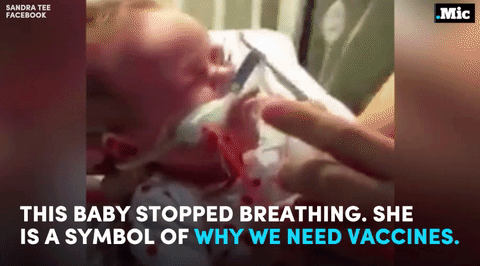

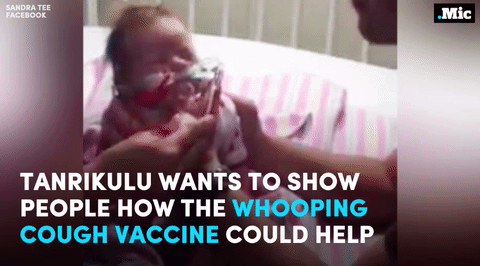
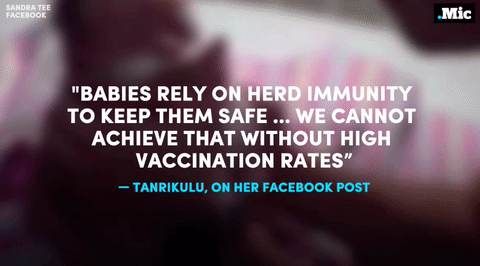

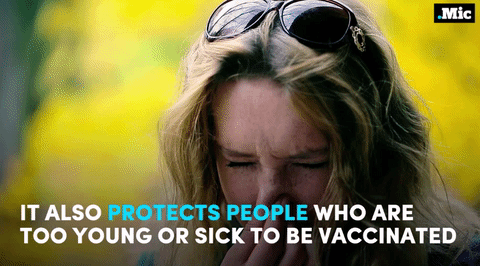
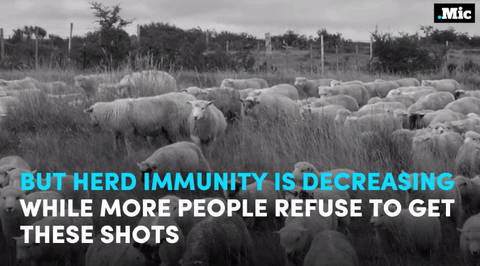
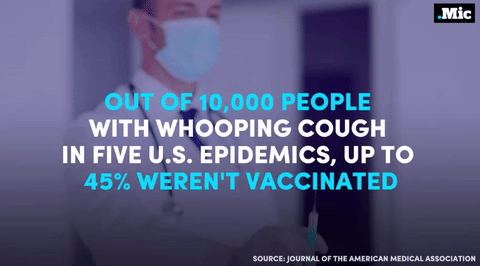
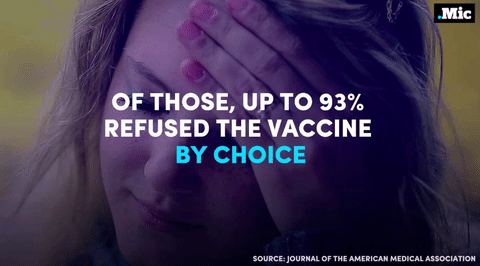

this is why we need vaccines (x) | follow @the-future-now
14K notes
·
View notes


